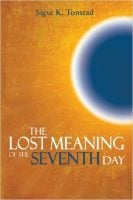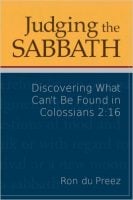- The Lost Meaning of the Seventh Day by Sigve K. Tonstad
Sigve Tonstad goes beyond apologetics for the seventh-day Sabbath to demonstrate that an understanding of the Sabbath is foundational to an understanding of the gospel and of the character of God. He argues that the seventh day is the symbol of God’s faithfulness precisely when God’s presence seems to be in doubt. He demonstrates how God, through the seventh day, seeks the benefit of all creation. Inevitably, this leads to an investigation of how this universal symbol became obscured. He traces the seventh day as it is woven throughout Scripture and the history of Christianity. Its twenty-seven chapters consider, among other things, the relationship of the seventh day to freedom, to social conscience, to the “greatest commandment,” and to the enigmatic “rest that remains.” Tonstad engages the move away from the seventh day in early Christian history, the mindset in medieval Christianity, and the sobering long-term implications leading all the way to the Holocaust and the ecological crises in our time. Even though the content compares well with any scholarly work, Tonstad writes in an engaging and accessible style. Highly recommended. 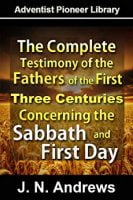 The Complete Testimony of the Fathers of the First Three Centuries Concerning the Sabbath and First Day by J.N. Andrews, published in 1873, fills a niche for those who meet arguments for Sunday from “the early church fathers.”
The Complete Testimony of the Fathers of the First Three Centuries Concerning the Sabbath and First Day by J.N. Andrews, published in 1873, fills a niche for those who meet arguments for Sunday from “the early church fathers.”
Andrews offers a more complete testimony than is generally offered by Sunday apologists and he demonstrates how the early consensus on seventh-day Sabbath keeping was gradually replaced by first-day keeping. (127 pages in the paper edition) Note that this is included in History of the Sabbath and First Day of the Week by JN Andrews.
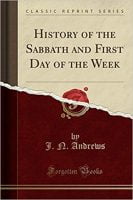 History of the Sabbath and First Day of the Week by JN Andrews is a scholarly and comprehensive review of the subject. Published in 1859 by one of the pioneers of the Seventh-day Adventist Church, it has stood the test of time and is as valuable today as it was at publication date. At 542 pages in paperback, it takes a bit of a commitment to read, but students who want the complete history will appreciate this volume. (This is the paperback version, and you can get a hardback copy for about $10 more.
History of the Sabbath and First Day of the Week by JN Andrews is a scholarly and comprehensive review of the subject. Published in 1859 by one of the pioneers of the Seventh-day Adventist Church, it has stood the test of time and is as valuable today as it was at publication date. At 542 pages in paperback, it takes a bit of a commitment to read, but students who want the complete history will appreciate this volume. (This is the paperback version, and you can get a hardback copy for about $10 more. 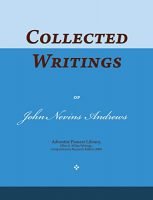 If you search Google, you can also find the book to read for free. It is also available in the EGW Writings 2 app for Kindle and iBooks, which can be found in the Android app store or the iStore. We own an original, rebound copy of the book.) We do not recommend the Kindle version of this book because it is not well executed and not worth the price. Instead, we reccommed the Collected Writings, which includes this book, costs less and is better executed.)
If you search Google, you can also find the book to read for free. It is also available in the EGW Writings 2 app for Kindle and iBooks, which can be found in the Android app store or the iStore. We own an original, rebound copy of the book.) We do not recommend the Kindle version of this book because it is not well executed and not worth the price. Instead, we reccommed the Collected Writings, which includes this book, costs less and is better executed.)
The Collected Writings of John Nevins Andrews is an amazing value, since it includes not only the History of the Sabbath, the Testimony of the Fathers, but many other books, pamphlets and sermons as well. Andrews was widely read and a careful scholar. Thus his writings have stood the test of time. For the researcher, an advantage of ebooks is that they are searchable, and it is easy to find what you are looking for.
The Hebrew Feast Days
Judging the Sabbath: Discovering What Can’t Be Found in Colossians 2:16 by Ron DuPreez
This book contains the most complete and detailed scholarly study of the biblical phrase “feasts, new moon or Sabbath” in Colossians 2:16. Most interpreters have argued that the sequence indicates yearly feasts, monthly celebrations, and the seventh-day Sabbath. Ron du Preez carefully argues that the term sabbath does not designate the seventh-day Sabbath in that passage, thus seriously undermining the prevailing view.

